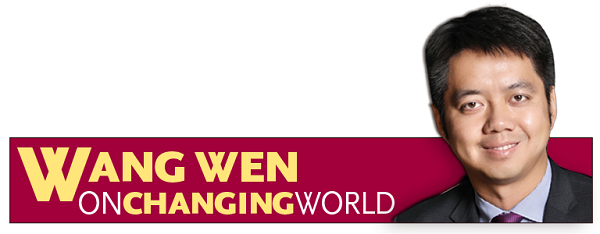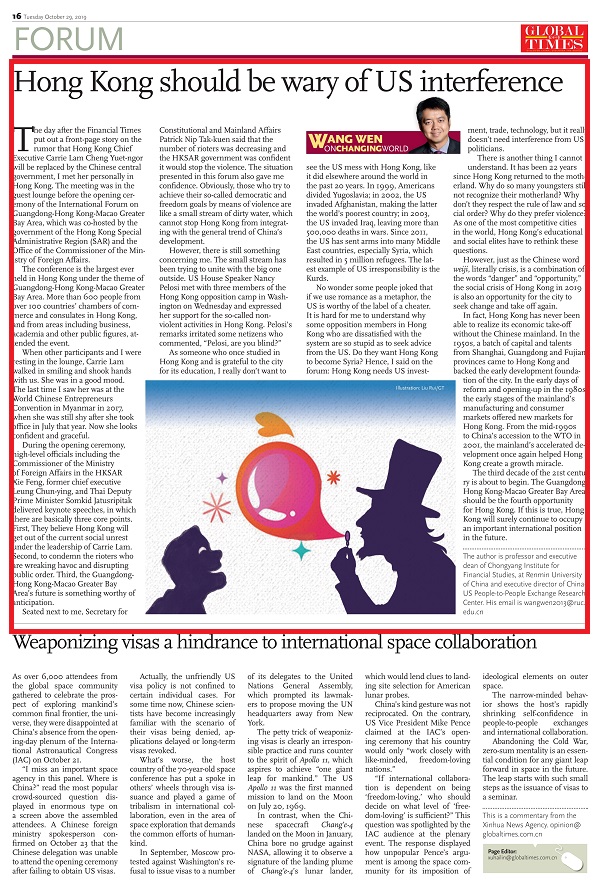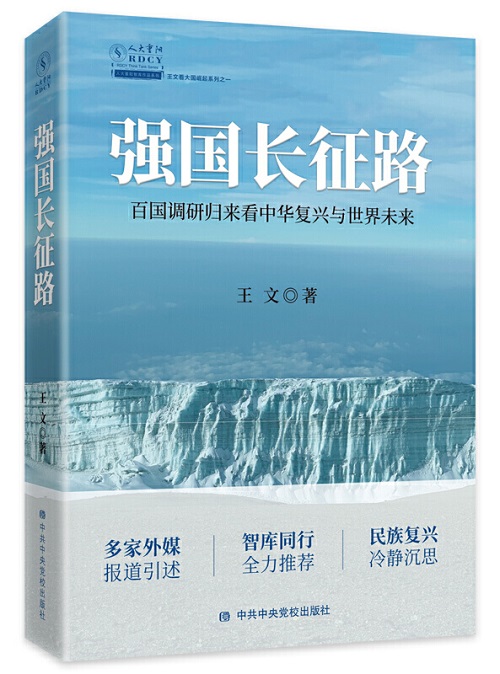Commentaries
Your Present Location: Teacher_Home> Wang Wen> CommentariesWang Wem: Hong Kong should be wary of US interference
By Wang Wen Source: Global Times Published: 2019-10-28

The day after the Financial Times put out a front-page story on the rumor that Hong Kong Chief Executive Carrie Lam Cheng Yuet-ngor will be replaced by the Chinese central government, I met her personally in Hong Kong. The meeting was in the guest lounge before the opening ceremony of the International Forum on Guangdong-Hong Kong-Macao Greater Bay Area, which was co-hosted by the government of the Hong Kong Special Administrative Region (SAR) and the Office of the Commissioner of the Ministry of Foreign Affairs.
The conference is the largest ever held in Hong Kong under the theme of Guangdong-Hong Kong-Macao Greater Bay Area. More than 600 people from over 100 countries' chambers of commerce and consulates in Hong Kong, and from areas including business, academia and other public figures, attended the event.
When other participants and I were resting in the lounge, Carrie Lam walked in smiling and shook hands with us. She was in a good mood. The last time I saw her was at the World Chinese Entrepreneurs Convention in Myanmar in 2017, when she was still shy after she took office in July that year. Now she looks confident and graceful.
During the opening ceremony, high-level officials including the Commissioner of the Ministry of Foreign Affairs in the HKSAR Xie Feng, former chief executive Leung Chun-ying, and Thai Deputy Prime Minister Somkid Jatusripitak delivered keynote speeches, in which there are basically three core points. First, They believe Hong Kong will get out of the current social unrest under the leadership of Carrie Lam. Second, to condemn the rioters who are wreaking havoc and disrupting public order. Third, the Guangdong-Hong Kong-Macao Greater Bay Area's future is something worthy of anticipation.
Seated next to me, Secretary for Constitutional and Mainland Affairs Patrick Nip Tak-kuen said that the number of rioters was decreasing and the HKSAR government was confident it would stop the violence. The situation presented in this forum also gave me confidence. Obviously, those who try to achieve their so-called democratic and freedom goals by means of violence are like a small stream of dirty water, which cannot stop Hong Kong from integrating with the general trend of China's development.

However, there is still something concerning me. The small stream has been trying to unite with the big one outside. US House Speaker Nancy Pelosi met with three members of the Hong Kong opposition camp in Washington on Wednesday and expressed her support for the so-called non-violent activities in Hong Kong. Pelosi's remarks irritated some netizens who commented, "Pelosi, are you blind?"
As someone who once studied in Hong Kong and is grateful to the city for its education, I really don't want to see the US mess with Hong Kong, like it did elsewhere around the world in the past 20 years. In 1999, Americans divided Yugoslavia; in 2002, the US invaded Afghanistan, making the latter the world's poorest country; in 2003, the US invaded Iraq, leaving more than 500,000 deaths in wars. Since 2011, the US has sent arms into many Middle East countries, especially Syria, which resulted in 5 million refugees. The latest example of US irresponsibility is the Kurds.
No wonder some people joked that if we use romance as a metaphor, the US is worthy of the label of a cheater. It is hard for me to understand why some opposition members in Hong Kong who are dissatisfied with the system are so stupid as to seek advice from the US. Do they want Hong Kong to become Syria? Hence, I said on the forum: Hong Kong needs US investment, trade, technology, but it really doesn't need interference from US politicians.
There is another thing I cannot understand. It has been 22 years since Hong Kong returned to the motherland. Why do so many youngsters still not recognize their motherland? Why don't they respect the rule of law and social order? Why do they prefer violence? As one of the most competitive cities in the world, Hong Kong's educational and social elites have to rethink these questions.
However, just as the Chinese word weiji, literally crisis, is a combination of the words "danger" and "opportunity," the social crisis of Hong Kong in 2019 is also an opportunity for the city to seek change and take off again.
In fact, Hong Kong has never been able to realize its economic take-off without the Chinese mainland. In the 1950s, a batch of capital and talents from Shanghai, Guangdong and Fujian provinces came to Hong Kong and backed the early development foundation of the city. In the early days of reform and opening-up in the 1980s, the early stages of the mainland's manufacturing and consumer markets offered new markets for Hong Kong. From the mid-1990s to China's accession to the WTO in 2001, the mainland's accelerated development once again helped Hong Kong create a growth miracle.
The third decade of the 21st century is about to begin. The Guangdong-Hong Kong-Macao Greater Bay Area should be the fourth opportunity for Hong Kong. If this is true, Hong Kong will surely continue to occupy an important international position in the future.
The author is professor and executive dean of Chongyang Institute for Financial Studies, at Renmin University of China and executive director of China-US People-to-People Exchange Research Center. His new book Great Power's Long March Road was launched recently.
























































































 京公网安备 11010802037854号
京公网安备 11010802037854号





